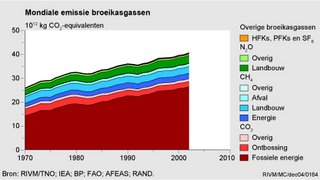 Inter Press Service bericht: ' Conservation Lagging as Emissions Climb.
Inter Press Service bericht: ' Conservation Lagging as Emissions Climb.UNITED NATIONS - Late last week, representatives from 165 industrialised and developing countries -- excluding the United States -- agreed to extend a global plan to reduce the emissions that contribute to global warming past its expiration date of 2012. But experts say a long-term energy strategy is not just about reducing greenhouse gases. It also requires programmes to boost conservation and energy efficiency, and shift economies toward renewable resources like biogas, wind, solar and hydrogen. According to statistics from the European Commission, if current policies remain unchanged, world energy demand will soar by over 50 percent by 2030. The World Bank's recently released "Little Green Data Book 2006" notes that the richest countries devour 51 percent of the world's energy production, and consume on average 11 times more energy per capita than low-income countries. "The book shows that high-income countries are not saving enough (energy) resources for the future," said Laura Tlaiye of the World Bank's environment department. Under the Kyoto Protocol, 36 highly industrialised nations must reduce their greenhouse gas emissions by at least 5.2 percent below 1990 levels by 2012. Meeting in Bonn this month, parties to the Kyoto pact agreed in principle that even deeper cuts in emissions would be needed after that deadline.' Lees verder:
http://www.commondreams.org/headlines06/0601-05.htm



Geen opmerkingen:
Een reactie posten